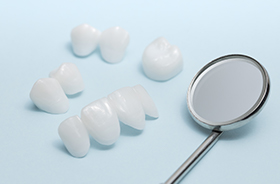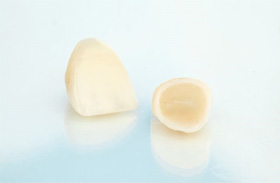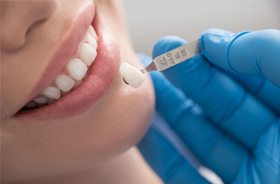
Dental Crowns – Woodbridge, CT
Repair and Renew Dental Teeth

Do you have a decayed, damaged, or misshapen tooth? Crowns are custom-made restorations we can use to repair and enhance damaged teeth, and thanks to our team’s skill and artistic eye, you can trust that the end result will be both functional and aesthetically pleasing. If you are in need of some top-quality smile repair, give New Haven Dental Group a call today to discuss smile repair with dental crowns in Woodbridge, CT.
Why Choose New Haven Dental Group for Dental Crowns?
- Custom designed for every patient
- 100 percent porcelain crowns available
- Designed to look natural and stand the test of time
What Is a Dental Crown?

A dental crown gets its name from the fact that it literally sits on top of a natural tooth, covering the entire portion of the tooth above the gum line. This enables it to fulfill two important purposes: One, it protects weakened or fragile enamel, and two, it restores a tooth’s shape and appearance. Crowns help us save damaged teeth from extraction, making them an important part of conservative dentistry that is focused on each patient’s well-being.
How We Use Dental Crowns

With a dental crown, we can accomplish all of the following:
- Repair a cavity that is too large for a filling
- Hold a broken tooth together
- Prevent a cracked tooth from breaking
- Protect a tooth that has undergone a root canal
- Cosmetically enhance a tooth
- Balance the bite to relieve TMJ pain/headaches
- Replace a missing tooth (when paired with a dental implant)
Crowns can be made from a variety of materials, ranging from all-metal to all-porcelain. The material we choose will be based on where in the mouth a tooth is located as well as a patient’s specific situation and preferences. Generally, a back tooth needs to be as strong as possible, so we will use a metal crown, while a front tooth needs to be strong and pleasing to look at, in which case we can provide an all-porcelain crown.
What Is the Procedure Like?

The procedure to get a crown involves three basic phases that will unfold across two appointments:
- First, your dentist will examine your tooth and recommend a treatment. If you agree to receive a crown, your dentist will proceed to the next two steps.
- Your tooth will need to be reshaped in order to fit well beneath the crown, so after numbing you, your dentist will remove any damaged or decayed enamel. Once this is complete, they will take an impression of your tooth and send it to a dental lab, which will then create your crown. Before you leave this appointment, you will receive a temporary restoration.
- About a week or so later, you will return to our dental office to have your temporary removed and your final crown cemented into place. After our team checks the fit and your bite one last time, you can go off and enjoy the benefits of having a restored tooth.
What to Expect with a Dental Crown

Right after the procedure, your tooth might feel extra sensitive for a few days, but this should subside naturally. To take care of your crown, all you need to do is treat it like a natural tooth; you should brush, floss, and attend regular checkups. With proper care, your crown has the potential to last for about 15-20 years.
Understanding the Cost of Dental Crowns

The cost of dental crowns can vary depending on a few different factors. During your restorative consultation, we will be able to share some specific numbers with you. We will also help you to understand your payment options, such as insurance, financing, and the Essential Dental discount plan. Many patients are surprised by how affordable their treatment can be!
Factors that Affect the Cost of Dental Crowns

Some factors that may influence the cost of your crown include:
- Preparatory treatment. Some patients need root canal therapy or other treatments before they can receive a crown. A number of individuals even get a dental implant to support a crown. Such treatments come with their own price tag.
- Crowns can be constructed out of various materials, such as metal, porcelain-fused-to-metal, ceramic, and others. Each type of crown comes at a different price, and each has its own pros and cons. We will recommend the type that we believe best fits your situation.
- The crown-making process. Laboratory fees and other expenses in the crown-making process may have a bearing on the final price.
Keep in mind that if you come across a deal for a “cheap” crown, it is best to be cautious. Quality is important for dental treatment, and patients are often disappointed with low-cost options. You want a crown that looks good, feels good, and will last for several years.
Does Dental Insurance Cover Dental Crowns?

It is very common for dental insurance to cover dental crowns. Usually, this treatment is classified as a major procedure, so around 50% of its cost might be covered, up to the amount of your policy’s annual maximum. (If your crown is purely for cosmetic purposes, however, it might not be covered at all. It should be important for your oral health in order to qualify for coverage.) Our team accepts more than 200 dental insurance plans; we will be happy to help you maximize your benefits.
Other Options for Making Dental Crowns Affordable

Aside from insurance, there are a few provisions that might make it easier for you to afford your crown:
- The Essential Dental discount plan provides reduced prices on virtually all of the services available at New Haven Dental Group in Woodbridge, including crowns. Signing up is easy, and you can start to use your benefits immediately.
- Financing is available for most patients. All you have to do is apply for a low-interest payment plan through CareCredit. If you are approved, you will get to choose between a few different monthly payment amounts.
Are you curious to learn more about dental crowns and their cost? Get in touch with our team today to book a consultation.
Dental Crowns FAQs

If you suspect you need a dental crown, our Woodbridge team is ready and eager to serve you. Prior to booking your consultation, however, you may want to gather more information about the road in front of you. To assist you, we have compiled the following list of dental crowns FAQs, along with succinct answers. If your specific questions are not included here, give us a call. We will be pleased to speak with you.
What Are Dental Crowns Made Of?
Dental crowns can be constructed out of a range of materials. Here in our practice, we tend to use the following:
- Stainless steel crowns are good for temporary crowns because they are cost-effective and relatively easy to remove.
- Metal crowns, including those made of gold, silver, nickel, chromium, and palladium, are extremely durable. We often use them for the teeth toward the back of the mouth that must endure a lot of pressure during chewing.
- Porcelain-fused-to-metal (PFM) crowns consist of a metal inner lining that is surrounded by porcelain. PFM crowns combine the durability of metal with the natural appearance of porcelain.
- All porcelain crowns are the most aesthetically pleasing type of restoration. We frequently use them to treat teeth that are easily visible when a patient smiles.
Are Dental Crowns Permanent?
During the crown preparation portion of treatment, our team usually has to remove a significant amount of enamel from the tooth. The enamel will never be able to regrow on its own, so the tooth will always need a crown to protect it from outside stimuli. In a sense, then, it can be said that crowns require a permanent commitment.
However, you should not expect your crown to last forever. It may last for 5 – 15 years before it needs to be replaced. You can help it to endure as long as possible by sticking to a thorough oral hygiene routine, regularly visiting us for checkups, and taking other simple precautions.
Do Dental Crowns Get Cavities?
It is technically impossible for crowns to get cavities because they do not decay like natural tooth enamel. However, the tooth beneath a crown can still get cavities. This can occur if bacteria and plaque collect along the gumline. Eventually, they can sneak beneath the restoration and damage the underlying dentition.
The best way to prevent cavities on restored teeth is by adhering to good habits. For example, you should thoroughly brush your teeth twice a day, floss once a day, eat a balanced diet, and attend regular dental cleanings.
Does It Hurt to Get a Dental Crown?
We always numb the tooth we will be working on, so you should not expect to experience any pain during the crown preparation process. Once the local anesthesia wears off, though, your tooth and gums may be sore and sensitive for a while. This can also happen after a permanent crown is placed. Usually, any discomfort wears off within a few weeks. In the meantime, you can minimize unpleasantness by eating a soft, non-spicy diet and taking other measures to be gentle with your treated tooth. It is also fine to take OTC pain relievers if necessary.